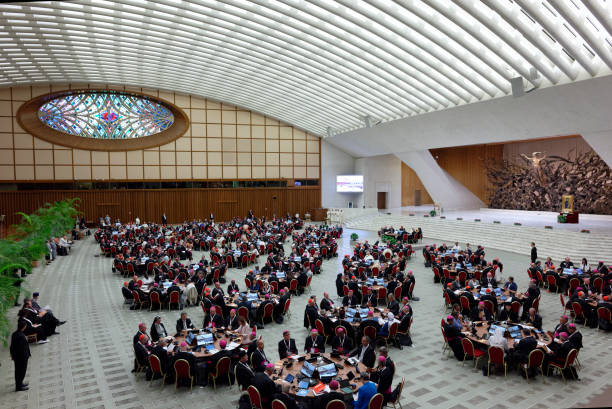In the Theological Lecture Hall column of the Catholic Times, the director of a theological cultural research center gives the readers some background on the situation of the church in society and its mission.
The growth of the church seems to have reached its limit. In the latter half of the 20th century, beyond the strong waves of secularization, religion seemed to be becoming more active to the extent that we heard the words: 'return of religion'. Except for the European churches, all churches in the world were seeing growth. In the 1990s, the Korean church reached its peak of expansion.
However, in the 21st-century era of post-secularization, religion is losing its influence. Korean churches are also shrinking. Of course, there are parishes that grow thanks to the individual capabilities of their pastors. There are also parishes that grow due to social factors such as expansion of population. However, the overall trend of the church is a period of contraction rather than growth.
A crisis always brings back fundamental questions. What is church? What is the church for? It is a question about identity and mission. Identity and mission are connected as one.
The church exists to carry out the mission of evangelization. A missionary church is what the church is. Recognizing its own identity and mission again and rebuilding it is the church's way of responding to times of crisis. All of Pope Francis' efforts are an extension of this. Synodalitas is the internal renewal of the church
to become a missionary church.
In general, when the church defined missions as "proclaiming the gospel and planting churches" (Mission Decree, Article 6 Vatican II Documents), there was a tendency to equate proclaiming the gospel with evangelization. In other words, evangelization was understood as an element of mission. However, a new concept was needed because the traditional concept of missionary work was considered to have a kind of colonialist tendency, showing the characteristics of Western centrism.
Evangelii nuntiandi (Evangelization in the Modern World; is an apostolic exhortation issued in 1975 by Pope Paul Vl on the theme of Catholic evangelization.
It affirms the role of every Christian, not only ordained ministers,
priests, and deacons, or religious, or professional church staff, in
spreading the Gospel of Jesus Christ. It provided a holistic and new understanding of the concept of evangelization. The
concept of evangelization came to be established as a concept encompassing the mission and activities of the church.The changed understanding of evangelization led to the acceptance of missionary activities as an element of evangelization. In other words, it emphasizes mission as evangelization.Evangelization as an element of mission changes to mission as an element of evangelization.
Evangelization includes all three aspects of the church's mission and activity. Evangelization includes general pastoral care that "helps believers to respond more fully to God’s love in their lives by orienting themselves towards spiritual growth" and new evangelization (that helps "those who were baptized but did not live according to the demands of baptism" to experience conversion). It includes both re-evangelization) and missions "proclaiming the Gospel to those who do not know Jesus Christ or to those who still reject Him" (foreign missions). (The Joy of the Gospel, paragraph 14)
Evangelization, missions, and pastoral care have no clear boundaries and are closely interconnected. The concepts of evangelization, mission, and pastoral care allow us to understand the mission and activities of the church from various angles. The traditional understanding of missions and pastoral care had an aspect of strengthening clergy-centered church activities. However, a changed understanding of evangelization also results in a new understanding of church activities and an expansion of the scope of lay participation. The concept of evangelization is a comprehensive thing that encompasses mission and pastoral care, and is positioned as a theological term that can promote change and renewal of the church in various aspects.
Synodalitas
The method of evangelization also varies depending on the way the church exists and operates. If evangelization is not carried out properly today, it ultimately means that there is a problem with the way the church exists and operates. Evangelization can be better carried out through the evangelization of church members and church structures. The evangelization of the world and the evangelization of the church always go together.
The church is not a socially or culturally autonomous space. The church is always under the influence of times and culture. The church borrows much from the culture of its time. However, the church creates its own unique culture by renewing the borrowed things from the perspective of the gospel. Synodalitas reflects the church's movement to better carry out its mission of evangelization by renewing its structures, relationships, and methods of communication within the church. Synodalitas is the Church's effort to become more effective in carrying out her mission of evangelization in the world.
Synodalitas does not simply aim to change the way the church operates at a functional level. It is an effort to breathe newness into the way the church exists and works, and it is an effort to pursue new church methods at the spiritual, pastoral, and institutional levels. It is an effort to reorganize the church according to the times and culture, and an effort to find models for carrying out the mission of evangelization in various theological, cultural, and institutional forms.
It is a time when we must deeply think about the evangelization of the church for the evangelization of the world. Will we prepare for a new beginning through change and renewal, or will we live in the old way and follow the path of decline?






